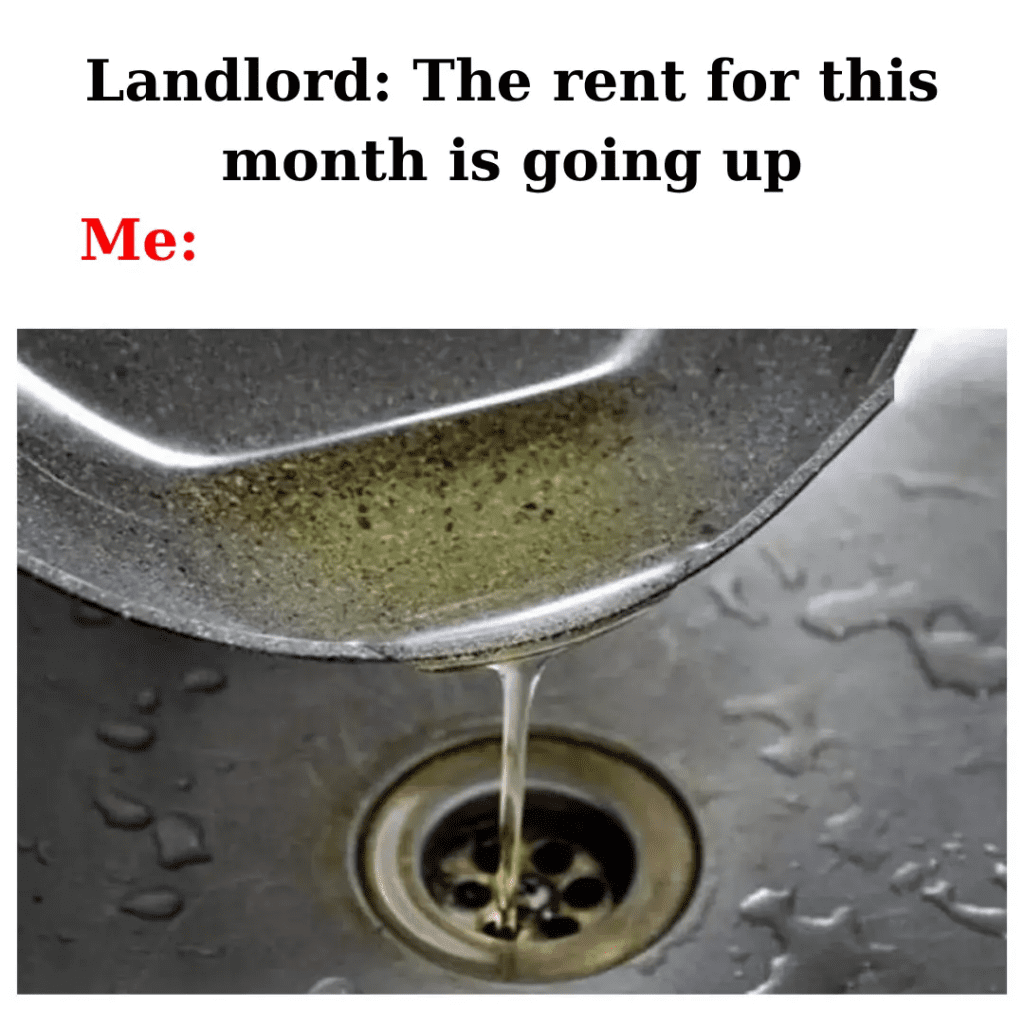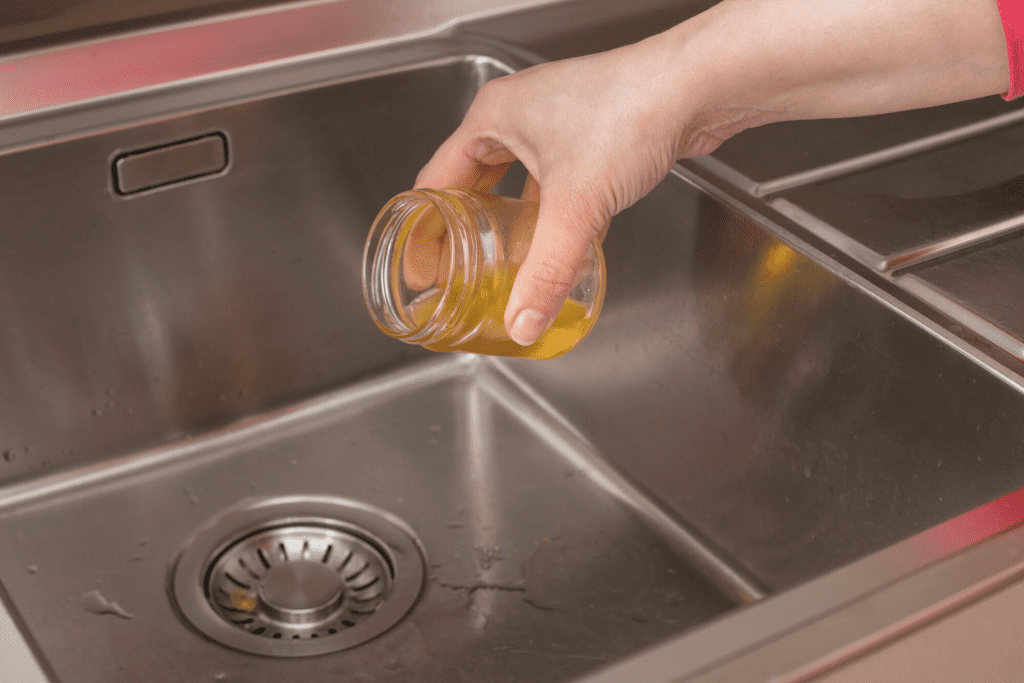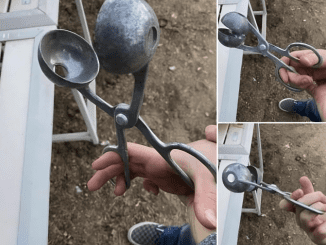Many people don’t realize that disposing of used cooking oil by pouring it down the sink is one of the worst things you can do to your plumbing and the environment. While it may seem harmless at first—after all, oil is liquid when hot—once it cools, it solidifies, sticks to pipes, and causes major clogs.
If you’ve ever dealt with a blocked sink or an expensive plumbing repair, improper oil disposal could be the reason. But beyond personal inconveniences, this issue extends far beyond your home—it contributes to city-wide plumbing disasters, causes pollution, and harms local ecosystems.

What Happens When You Pour Oil Down the Drain?
When hot oil is poured down the sink, it flows freely for a short time. However, once it cools, it starts to thicken and solidify, coating the walls of your pipes. Over time, this residue builds up, leading to slow drainage, blockages, and even complete pipe obstructions.
Even if you flush it with hot water, the oil doesn’t just disappear. Instead, it moves further down the pipeline where it meets cooler temperatures and begins to solidify again. This process continues until a thick grease buildup forms, causing serious plumbing problems.
The Problem Doesn’t Stop at Your Home
Your sink isn’t the only thing affected. When cooking oil enters public sewage systems, it mixes with other waste materials like food scraps, hair, and cleaning chemicals. The result? A disgusting, hardened mass known as a fatberg.
Fatbergs are enormous blockages in public sewage systems that:
- Cause major clogs in drainage pipes.
- Lead to sewage backups in homes and streets.
- Contribute to expensive repair costs for cities and taxpayers.
One of the largest recorded fatbergs was found in London in 2017. Weighing an astounding 130 tons, it was as hard as concrete and stretched over 800 feet long. Cities worldwide face similar issues, costing millions to remove these sewer-clogging giants.
The Environmental Consequences of Oil Disposal in Drains
Beyond damaging pipes and sewage systems, improper oil disposal is also an environmental hazard.
1. Water Pollution and Wildlife Harm
When oil enters waterways, it creates an oily film on the water’s surface, preventing oxygen from reaching aquatic life. This can:
- Choke fish and marine creatures, leading to mass die-offs.
- Pollute drinking water sources, making them unsafe.
- Damage aquatic ecosystems, affecting both plants and animals.
2. Soil Contamination
If oil spills from clogged drainage systems, it can seep into the ground, contaminating soil and affecting plant life. This pollution can damage crops, harm natural habitats, and reduce soil fertility.
3. Increased Carbon Footprint
Processing and removing fatbergs require energy-intensive machinery and toxic cleaning chemicals, increasing a city’s carbon footprint. By properly disposing of cooking oil, you help reduce unnecessary pollution and energy waste.
How to Properly Dispose of Used Cooking Oil

Instead of pouring oil down the drain, try these safe and environmentally friendly disposal methods:
1. Let It Cool and Throw It Away
- Allow used oil to cool completely after cooking.
- Pour it into a sealed container (like an old jar or plastic bottle).
- Dispose of it in the trash once the container is full.
2. Recycle It
Some cities have oil recycling programs where you can drop off used cooking oil. It can then be repurposed into biodiesel, an eco-friendly fuel alternative.
3. Use It for Composting (For Small Amounts Only)
If the oil is vegetable-based and in small quantities, you can mix it with compost to enrich soil. However, avoid using too much, as excessive oil can create an oxygen barrier and prevent decomposition.
4. Save and Reuse It
If you’ve used the oil for frying and it’s still clean, strain it through a fine mesh or coffee filter and store it for reuse. This works well for frying foods multiple times, reducing waste and saving money.
What About Restaurant and Large-Scale Oil Waste?
Restaurants and food service businesses generate large quantities of used cooking oil, which, if not properly disposed of, can cause severe damage to city sewage systems. Many places:
- Partner with grease collection services that convert waste oil into biofuel.
- Use grease traps to prevent oil from entering sewage lines.
- Follow strict disposal regulations to prevent plumbing damage and environmental pollution.
If you run a restaurant or food business, it’s essential to implement proper oil disposal practices to avoid legal and financial penalties.
The Cost of Ignoring This Problem

Still thinking about pouring that leftover oil down the drain? Consider these potential consequences:
- Plumbing repairs: Clogged pipes can result in expensive plumber visits, costing anywhere from $150 to $1,000+ depending on the severity.
- City fines: Some local governments impose heavy fines on businesses and individuals who improperly dispose of grease and oil.
- Environmental damage: The long-term effects on ecosystems and water supplies can be devastating.
Final Thoughts: A Small Change That Makes a Big Difference
While pouring oil down the drain might seem like a harmless shortcut, it leads to long-term consequences—both for your home and the environment. By adopting safe disposal methods, you protect your plumbing, help prevent fatbergs, and reduce pollution.
The next time you cook, remember: your sink isn’t a garbage can. Take the extra step to dispose of oil the right way—your pipes (and the planet) will thank you.


